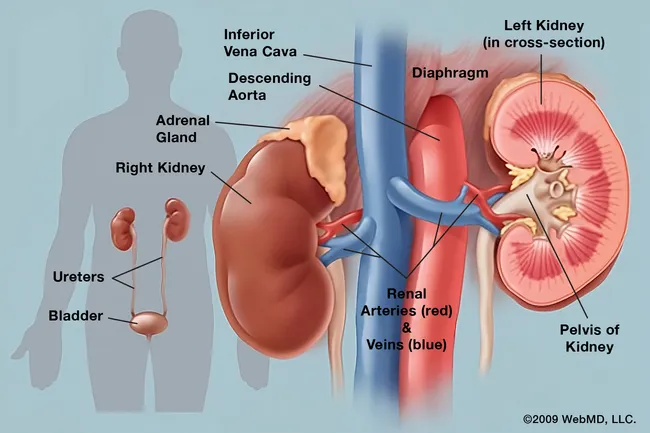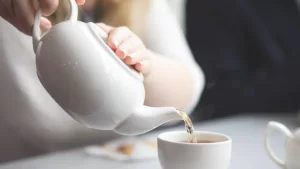
Share this

Kidney damage in acute kidney failure can be reversed with hospitalization and lifestyle modifications. However, chronic kidney failure is often irreversible
Kidney damage is divided into two types:
- Acute kidney disease or acute kidney failure: Damage has occured in a short period, such as in hours or a few days
- Chronic kidney disease or chronic kidney failure: Damage has occured over several months or years
While a damaged kidney typically can’t repair itself, the condition can be treated if caught early. Acute kidney failure can be reversed with prompt hospitalization, although the recovery process can take weeks to months and requires regular monitoring, diet modifications, and medications.
Chronic kidney failure, however, is often irreversible. Chronic kidney disease (CKD) occurs when kidney damage worsens over time. There is no cure for CKD other than dialysis and kidney transplant.
Preliminary studies on animals have shown regeneration of kidneys with stem cell therapy, but more research is needed to support the use of stem cell therapy in the treatment of kidney failure.
What causes kidney damage?
Causes of acute kidney disease include:
- Severe infection
- Dehydration
- Drugs, especially painkillers
- Urine blockage
- Surgery that puts pressure on the kidneys
- Kidney diseases:
- Chronic kidney disease
- Vasculitis
- Myeloma
Causes of chronic kidney disease include:
- Type I or type II diabetes
- Hypertension (high blood pressure)
- Glomerulonephritis (inflammation of the glomeruli or filtering units of the kidneys)
- Interstitial nephritis (inflammation of the tubules and surrounding structures of the kidneys)
- Inherited kidney diseases, such as polycystic kidney disease
- Enlarged prostate
- Kidney stones
- Some cancers
- Pyelonephritis (recurrent kidney infection)
- Frequent use of medications that damage the kidneys
Conditions that can increase the risk of CKD:
- Heart disease
- Smoking
- Obesity
- Family history of kidney disease
- Developmentally abnormal kidney
How is a damaged kidney treated?
Treatment options for kidney damage depend on cause and severity, which can be detected through:
- Blood tests: Serum creatinine levels that reach 5 or more in adults may indicate severe kidney damage.
- Glomerular filtration rate (GFR): Damaged kidneys have a GFR that is equal to or less than 15.
Damaged kidneys will require either dialysis or kidney transplantation, as no medication can reverse chronic damage. In some cases, however, angiotensin-converting enzyme inhibitors (enalapril, captopril, lisinopril), angiotensin II receptor blockers (telmisartan, losartan), and some calcium channel blockers (cilnidipine) can prevent the damage from worsening.
Ways to Keep Your Kidneys Healthy
Don’t Overdo Certain Medications

NSAIDs are nonsteroidal anti-inflammatory drugs, like ibuprofen and naproxen. They can damage your kidneys if you take too many at once or take them too often. And using proton pump inhibitors (PPIs) for an ulcer or GERD for a long time can raise your chances of chronic kidney disease. You should only take them if your doctor says you need them.
Take Care With Antibiotics

These bacteria-fighting drugs can damage your kidneys if you use them too often. It can happen even if you’re perfectly healthy, though it’s more serious if your kidneys don’t work as well as they should. Some types, like penicillin, sulfonamides, and cephalosporins, are more likely to cause problems.
Skip Herbal Supplements

Supplement makers don’t have to prove their products are safe, and some can damage your kidneys. Those can be especially harmful if you have kidney disease because they can make the condition worse or affect how some medicines work. Talk with your doctor before trying any herbal supplement.
Eat Healthy

Your kidneys process everything you eat or drink, including anything that’s bad for you, like lots of fat, salt, and sugar. Over time, a bad diet can lead to high blood pressure, obesity, diabetes, and other conditions that are hard on your kidneys. A healthy diet has lots of vegetables, fruits, and whole grains, and few processed foods.

This mineral affects people in different ways. For some, it seems to raise the amount of protein in their urine. That can harm your kidneys or make kidney disease worse if you already have it. Lots of salt also raises your chances of high blood pressure, a typical cause of kidney disease, and kidney stones, which can be very painful and possibly cause damage without treatment.
Drink Enough Water

Water helps get important nutrients to your kidneys and move waste to your bladder in the form of urine. If you don’t drink enough, the tiny filters inside your kidneys can get stopped up and lead to kidney stones and infections. Even mild dehydration can damage your kidneys if it happens often enough. Four to six cups a day is typically about right, but you might need more if you’re sick or out in the heat.

Just like a healthy diet, this helps prevent conditions like diabetes and heart disease that can lead to kidney damage. But don’t try to go from couch potato to gym rat in a day. Too much exercise can also damage your kidneys if you’re not ready for it. Work your way up to 30 to 60 minutes at least five days a week. Start slow if you haven’t done it in a while, and check with your doctor first if you have health issues.
Get Screened

It’s important to know your risk for kidney disease. It’s more likely if you or close relatives have heart disease, high blood pressure, diabetes, or a family history of kidney failure. In these cases, your doctor might suggest specific kidney tests as part of your regular checkup. The earlier you catch it, the easier it is to treat and sometimes even stop.
Be Careful With Alcohol

If you’re healthy, a drink or two isn’t likely to hurt your kidneys. But binge drinking (having more than four drinks in less than 2 hours) can cause sudden, serious damage and possibly lead to long-term problems. And alcohol often can dehydrate you, which can keep your kidneys from working well and lead to weight gain, liver disease, high blood pressure, and other conditions that put more stress on them.
Quit Smoking

Smoking raises your risk of kidney cancer and damages blood vessels, which affects your kidneys by slowing blood flow to them. Plus, smoking can affect certain drugs that treat high blood pressure. This is serious because uncontrolled high blood pressure is a leading cause of kidney disease.

The two most common conditions that affect your kidneys are diabetes and high blood pressure. A balanced diet and regular exercise can help keep both under control. With diabetes, it’s also important to keep a close eye on your blood sugar and take insulin when you need it. For high blood pressure, check your numbers regularly and take all medicines exactly as your doctor prescribes them.
Health SolutionsFrom Our Sponsors
- Penis Curved When Erect
- Could I have CAD?
- Treat Bent Fingers
- Treat HR+, HER2- MBC
- Tired of Dandruff?
- Life with Cancer
Lung & Respiratory: How to Prevent Mold in Your Home
Keep Things Dry

Mold spores can’t grow on dry surfaces. They need damp, wet spots to stick around and build up. Don’t let water hang around in your house. Wipe surfaces dry in the shower, clean up spills, and check for condensation on windows.
Fix Leaks

Inspect ceilings and walls for water bulges or spots. Fix leaks in your roof or plumbing promptly so water doesn’t have a chance to feed mold growth.

Be sure the air in your house is flowing well so humidity isn’t too high. Turn on fans or air conditioner to help any damp rooms dry out, or open windows for a cross breeze on cool, non-humid days.
Move That Laundry

When it comes to the wash, it’s easy to set it and forget it since it’s out of sight, out of mind. But don’t let wet clothes linger in the washer. The dark, damp washer drum is a prime spot for mold and mildew to set up shop.

Your bathroom sees regular wetness from shower and bath steam. Use products designed specifically to kill mold when you clean it.
Try a Vapor Barrier

A special moisture-blocking material called a vapor barrier is a great option for keeping dirt floor basements or crawl spaces dry. You can also use heavy roofing paper or polyethylene plastic film.

Both your kitchen and bathroom are great places for exhaust fans that vent to the outside. Instead of letting steam from cooking or bathing stick around to coat walls and cabinets, the fan pulls moist air outside.
Keep Tabs on Humidity

A hygrometer is a small handheld device you can buy to measure the amount of moisture in your home’s air. The goal is to keep humidity as low as you can — ideally below 50% — all day.

When liquid spills on tacked-down carpets, it can be hard to get them dry. If your carpet gets soaked, you may need to remove it. Switch to area rugs where you can, especially in rooms like the bathroom and kitchen where moisture is higher.
Act Quickly on Spills

See signs of a leak in your ceiling, or condensation forming on your windows or pipes? Tackle the problem ASAP. The longer moisture lingers, the more likely mold is to grow.

You can mix mold-blocking substances into paint to help create a barrier on surfaces as you coat them. This is especially helpful in bathrooms, kitchens, and other high-moisture areas.
Insulate Pipes

Pipes are prone to condensation, especially when they’re colder than the air around them. One way to combat this is by wrapping your pipes in foam or insulation to help keep moisture from forming.
Can Drinking Water Stop Kidney Failure?
How much water should you drink if your kidneys are failing?

The recommended amount of water for people with kidney failure depends on the stage of their disease.
While drinking more water can help boost kidney function, there is no evidence that suggests that an increase in water consumption will prevent the progress of kidney failure.
The National Kidney Foundation recommends for people with stages I and II chronic kidney disease (CKD) to consume 8 glasses of water per day and those with stages III, IV, and V CKD to limit water consumption. It is best to discuss your water and salt consumption with your doctor.
Under normal circumstances, daily water requirements are based on factors such as age, climate, and exercise intensity, as well as conditions such as pregnancy, breastfeeding, and illness.
What are the main functions of your kidneys?
Kidneys are a pair of bean-shaped organs located below the rib cage on either side of the spine. Their main functions include the following:
- Water balance
- Electrolyte balance
- pH balance
- Removal of toxins
- Excretion of waste products
- Blood pressure control
- Production of erythropoietin, which stimulates red blood cell production
- Activation of vitamin D
What causes kidney failure?
Kidney failure or end-stage renal disease occurs when the kidneys are unable to filter toxins and waste products, working less than 15% of their normal capacity.
Chronic renal failure causes
A gradual loss of kidney function may be caused by:
- Uncontrolled diabetes
- High blood pressure
- Chronic glomerulonephritis
- Polycystic kidney disease
- Kidney stones
- Nephrotic syndrome
- Interstitial nephritis
Acute renal failure causes
A sudden loss of kidney function occurs due to the following:
- Pre-renal causes
- Dehydration due to excessive diarrhea, vomiting, and sweating
- Hypovolemia due to heavy blood loss
- Decreased fluid intake
- Medications such as diuretics
- Obstruction in the renal artery
- Renal causes
-
- Sepsis due to infections and inflammations
- Medications such as nonsteroidal anti-inflammatory drugs (NSAIDs) and antibiotics
- Rhabdomyolysis
- Multiple myeloma
- Systemic lupus erythematosus
- Hemolytic uremic syndrome
- Post-renal causes
-
- Prostatic hypertrophy or prostate cancer
- Kidney stones
- Obstruction of the bladder or ureters
- Sudden blood flow loss
-
- Heart attack
- Burns
- Liver failure
- Allergic reactions
- Metal poisoning
What are the signs and symptoms of kidney failure?
Kidney failure can be asymptomatic initially, and if left untreated, can lead to life-threatening conditions:
- Whole body edema (swelling)
- Inability to pass urine or very little urine output
- Shortness of breath
- Weakness
- Lethargy
- Loss of appetite
- Abnormal heart rhythms
- Anemia
- Nausea
- Fatigue
- Hyperkalemia (high blood potassium level)
- Hypocalcemia (low blood calcium level)
- Metabolic acidosis (excessive amount of acids in the body)
- Congestive cardiac failure
- Uremia (high blood urea level)
- Drowsiness
- Itchy and dry skin
- Muscle cramps
What is the treatment for kidney failure?
If you have kidney failure, a healthy lifestyle, diet modifications, regular follow-ups, and appropriate medications may improve your quality of life and extend your lifespan:
- Dietary modifications such as the DASH diet (low-sodium) and renal diet (low-sodium, low-protein, and low-potassium, with controlled water intake)
- Managing blood pressure and diabetes
- Antibiotics for infections as needed
- Corticosteroids for immune-related conditions (nephrotic syndrome)
- Blood transfusions for anemia
- Intravenous fluids, if needed
Acute renal failure or end-stage renal disease is the most severe stage of kidney failure, with no cure. The only treatment options are:
- Hemodialysis: Machine that regularly (three to four times per week) filters the blood to remove toxins and waste products
- Peritoneal dialysis: Treatment that uses a catheter through the abdominal lining for blood filtration
- Kidney transplant: Only long-term solution in most cases






